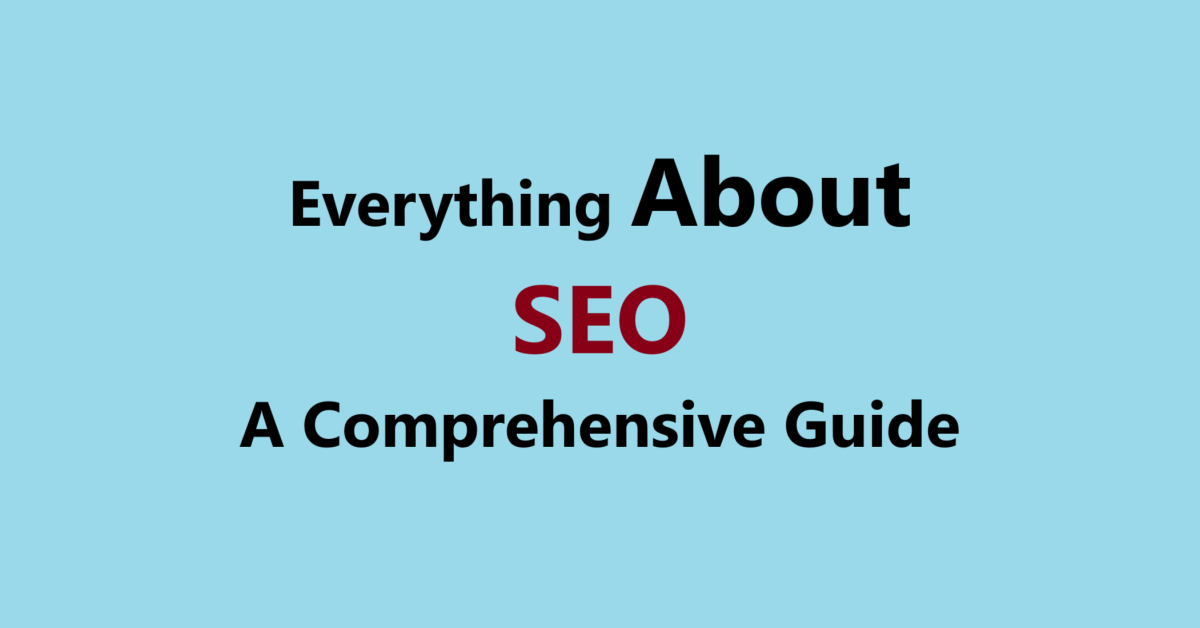Everything About SEO: A Comprehensive Guide
In today’s digital landscape, where consumers are becoming increasingly reliant on online resources, search engine optimization (SEO) has evolved into a fundamental component of any successful digital marketing strategy. As a discipline, SEO not only enhances the visibility and ranking of a website on search engines but also significantly contributes to user experience and the overall efficacy of online campaigns. In this blog post, we will explore the intricate world of SEO, covering its core principles, techniques, and the latest trends shaping its future.
Understanding SEO
At its core, SEO refers to the practice of optimizing websites and their content to achieve higher visibility on search engine results pages (SERPs). The primary objective is to attract organic (non-paid) traffic by improving the website’s relevance and authority in the eyes of search engines like Google, Bing, and Yahoo. Successful SEO involves a multifaceted approach that encompasses keyword research, on-page optimization, technical SEO, content creation, and backlinking strategies.
The Importance of SEO
The significance of SEO can be summarized in a few key points:
- Increased Visibility: Websites that rank higher on SERPs receive a greater share of clicks and, ultimately, traffic. Statistically, the first result on Google garners approximately 28% of all clicks, while results on the second page receive less than 1%.
- Enhanced User Experience: Optimizing a website for search engines often improves its usability and design. A well-structured site contributes to an enhanced user experience, resulting in lower bounce rates and higher engagement levels.
- Credibility and Trust: High-ranking websites are frequently perceived as more credible and trustworthy by users. This perception can lead to increased conversions and customer loyalty.
- Cost-Effective Marketing: Unlike paid advertising, SEO is a long-term investment. Though it requires time and effort, it can deliver sustainable traffic without ongoing costs.
Key Components of SEO
To successfully implement SEO initiatives, one must understand its core components:
- Keyword Research: The foundation of effective SEO is selecting the right keywords. Tools like Google Keyword Planner, SEMrush, and Ahrefs can help identify keywords relevant to your audience and industry. Focus on long-tail keywords that are less competitive but highly specific to your niche.
- On-Page SEO: This involves optimizing individual web pages to rank higher and earn more relevant traffic. Key elements include:
- Title Tags: Ensure the title of your page includes targeted keywords and is compelling to users.
- Meta Descriptions: Write informative meta descriptions that accurately summarize the content and entice users to click.
- Headers (H1, H2, H3): Use header tags to structure your content and include keywords.
- Content Quality: Deliver valuable, well-researched content that answers users’ search queries. Incorporating images, videos, and infographics can enhance engagement.
- Internal Linking: Linking to other relevant pages on your site can improve navigation and keep users on your site longer.
- Technical SEO: This aspect focuses on the backend structure of your website. Key factors include:
- Site Speed: Fast-loading pages enhance user experience and are favored by search engines.
- Mobile-Friendliness: With the growing number of mobile users, ensuring your site is responsive is crucial.
- Sitemap and Robots.txt: Create an XML sitemap for search engines to better understand your site structure and use robots.txt to guide indexing.
- Off-Page SEO: This involves strategies outside of your website to build authority. Backlinks—links from other websites to yours—are a vital component. Focus on:
- Quality over Quantity: Aim for links from authoritative and relevant sites.
- Content Marketing: Create high-quality content that others naturally want to link to.
- Social Media Engagement: Promote your content on social media to drive traffic and gain backlinks.
- Local SEO: For businesses with a physical presence, local SEO helps improve visibility in local search results. Key strategies include:
- Google My Business: Ensure your listing is accurate, complete, and optimized.
- Local Keywords: Use location-based keywords to attract regional traffic.
- Customer Reviews: Encourage satisfied customers to leave reviews on platforms like Google and Yelp.
Emerging Trends in SEO
As technology and user behaviors evolve, SEO continues to adapt. Here are some notable trends to keep an eye on:
- Voice Search Optimization: With the proliferation of devices like smart speakers, optimizing for voice search is essential. This typically involves focusing on natural language queries and longer, conversational keywords.
- Artificial Intelligence: AI-powered tools and algorithms, such as Google’s RankBrain, are changing the SEO landscape. Understanding user intent and delivering relevant content is becoming increasingly important.
- Video Content: Video is rapidly becoming a preferred content format. Optimizing video content for search engines can improve visibility and engagement. Incorporate video sitemaps and use relevant keywords in titles and descriptions.
- User Experience Signals: Factors such as page load speed, mobile optimization, and overall UX will increasingly influence rankings. Google’s Core Web Vitals are becoming critical measures for SEO success.
- Featured Snippets: Gaining a featured snippet can position your content at the top of search results. To optimize for this, provide concise answers to common questions within your content.
FAQs About SEO: Your Essential Guide to Search Engine Optimization
Search Engine Optimization (SEO) is a pivotal aspect of digital marketing that ensures your website ranks higher in search engine results. In an era where online visibility significantly impacts business success, understanding the nuances of SEO is crucial. This blog post addresses some of the most frequently asked questions about SEO, providing you with a comprehensive understanding of its components, strategies, and best practices.
What is SEO?
SEO stands for Search Engine Optimization. It involves optimizing a website to improve its visibility in search engine results pages (SERPs) for relevant search queries. The ultimate objective of SEO is to attract organic (non-paid) traffic to a website, thereby enhancing its chances of conversion, be it generating leads, sales, or simply raising brand awareness.
Why is SEO Important?
SEO is imperative for several reasons:
- Increased Visibility: A higher ranking on search engines means more visibility. Users tend to click on the first few results shown on the first page. By optimizing your website for SEO, you increase the chance of being among those listings.
- Credibility and Trust: Websites that rank higher in SERPs are often deemed more credible. Users trust search engines to provide them with relevant and authoritative content. A strong SEO strategy can position your brand as a trustworthy authority in your field.
- Better User Experience: SEO isn’t just about search engines; it’s also about enhancing user experience. Great SEO practices lead to better website navigation, faster load times, and high-quality content, which can help retain visitors.
- Cost-Effective Marketing: Organic traffic generated through SEO is often more cost-effective than paid advertising. While SEO requires an investment in time and resources, the returns can be substantial when done correctly.
How Do Search Engines Work?
Search engines, such as Google, utilize complex algorithms to determine the relevance and quality of web pages. Here’s a simplified overview of the process:
- Crawling: Search engines use crawlers, or bots, to explore the web. These bots crawl websites and analyze their content, structure, and links.
- Indexing: Once the content is crawled, it is indexed or stored in a massive database. This index is what search engines refer to when a user conducts a search.
- Ranking: When a search query is entered, algorithms assess the indexed pages based on numerous ranking factors to determine which pages are most relevant to display in the search results.
What Are Key SEO Components?
SEO encompasses several key components, typically categorized as follows:
- On-Page SEO: This involves optimizing individual web pages to rank higher. Key elements include:
- Title Tags: The title of the page, which appears in SERPs and should include target keywords.
- Meta Descriptions: Summaries of webpage content that entice users to click.
- Header Tags: Organized headings (H1, H2, H3) that enhance readability and signify the page structure.
- Content: High-quality, engaging, and relevant content that answers user intent.
- Off-Page SEO: This focuses on external factors that impact rankings, primarily through:
- Backlinks: Links from other websites pointing to your content, which signify authority and trustworthiness.
- Social Media Signals: Engagement on social platforms can indirectly boost SEO through increased visibility and traffic.
- Technical SEO: This pertains to the backend structure of a website, including:
- Site Speed: Fast loading times contribute to better user experience and rankings.
- Mobile Friendliness: With increasing mobile usage, having a responsive design is crucial.
- XML Sitemaps and Robots.txt: These elements guide search engines in indexing and crawling your site effectively.
How Long Does it Take to See Results from SEO?
The timeline for seeing results from SEO can vary significantly. While some may notice traffic increases within a few weeks of implementing SEO strategies, most typically see substantial results after three to six months. Several factors influence this timeline, including:
- Current Website Authority: Established domains tend to rank quicker than new ones.
- Industry Competition: Highly competitive niches may require more time and effort to achieve desired rankings.
- Quality of Implementation: Properly executed strategies yield faster results.
What is Keyword Research, and Why Is It Critical?
Keyword research is the process of identifying the terms and phrases that users input into search engines relevant to your business. This practice is critical for several reasons:
- Understanding User Intent: Keyword research helps identify what your target audience is looking for, enabling you to tailor content accordingly.
- Optimization Opportunities: Discovering low-competition but high-traffic keywords offers opportunities for optimization, helping you to rank higher without fierce competition.
- Content Strategy: Effective keyword research can inform your content strategy, ensuring that you produce topics that resonate with your audience.
How Often Should One Update SEO Strategies?
SEO is not a one-time effort but requires regular evaluation and adjustment. Generally, businesses should:
- Conduct Regular Audits: Periodically review your SEO performance, analyze traffic data, and identify opportunities for improvement.
- Monitor Algorithm Updates: Search engines regularly update their algorithms. Staying abreast of these changes and adapting your strategies is essential for maintaining rankings.
- Update Content: Refresh outdated content regularly to ensure it remains relevant and valuable to users.
Is SEO a One-Time Effort?
No, SEO is not a one-time task but rather an ongoing process. Search engines continuously evolve, user behavior changes, and competition remains dynamic. A robust SEO approach requires consistent monitoring, updating, and strategic adjustments.
Can I Do SEO Myself, or Should I Hire an Expert?
Whether to do SEO yourself or hire an expert depends on several factors, including:
- Knowledge and Skill Level: If you’re familiar with SEO fundamentals and have the time to learn, you may handle aspects of SEO yourself. Many resources, including online courses and blogs, offer valuable information.
- Time Investment: SEO requires significant time and dedication. If you have other business responsibilities, hiring an expert may be wise.
- Budget Considerations: Assess your budget. If resources allow, hiring an SEO professional or agency can provide specialized knowledge and save you time.
Conclusion
SEO is a dynamic and multifaceted discipline crucial for online success in the digital age. It requires ongoing learning, adaptation, and a comprehensive strategy to navigate its complexities. Organizations that prioritize SEO not only improve their visibility on search engines but also enhance their user experience, build credibility, and achieve sustainable growth. As trends continue to evolve, staying informed and agile will be paramount for businesses looking to thrive in an increasingly competitive landscape.
Through a combination of well-researched keywords, effective on-page and off-page strategies, and continuous adaptation to new trends, your business can harness the power of SEO to achieve its online marketing goals.


